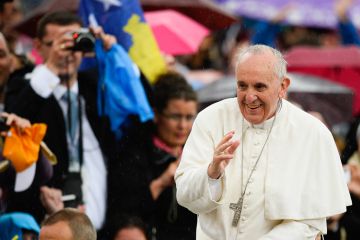The Language of Shaming: Pope Francis Urges Profound Change to Global Economic System
By Jason Berry
"The globalization that makes everything uniform is essentially imperialist and instrumentally liberal, but it is not human. In the end, it is a way to enslave nations." Those blunt words from spoken by Cardinal Jorge Mario Bergoglio in 2010 speak to the plight of millions who are jobless in Spain and Greece, their economies yoked to a European Union bank system meshed with globalized finance. The statement appeared in On Heaven and Earth, a dialogue book with Buenos Aires Rabbi Abraham Skorka, which is now available in English. In the two months since the cardinals’ conclave in Rome elected the little-known Argentine and the first Jesuit pope, Francis has taken to his pastoral role as Bishop of Rome. Refusing to live in the Apostolic Palace, he has made his home in a religious hotel in Vatican City, and he has replaced the pope’s golden throne with a wooden chair. He has dispensed with the ornate red stole with filigrees of gold that Pope Benedict wore, instead presenting himself in white, wearing a metal cross without the customary papal jewels and regalia. Benedict wore red shoes; Francis’s are black and workmanlike. This pope has also fashioned a symbolic language of shaming, and the candor in his statements and sermons aim to remind the clerical establishment — accustomed to lordly status — of the church’s core commitment to the poor. He has yet to make major personnel changes in a Roman Curia whose scandals riveted media coverage at the conclave, yet his rhetoric is that of a world leader endorsing purgative change. On May 25, Francis told members of a charitable foundation in Rome that unemployment was “spreading like wildfire in large areas of the West and ... alarmingly extending the boundaries of poverty.” He continued, “there is no worse material poverty, I would like to emphasize, than that which deprives someone of earning their living, deprives them of the dignity of work. By now this 'something wrong' is not just affecting the southern regions of the world, but the entire planet.” He called for “a global rethinking of the entire system, seeking ways to reform and correct it in a manner consistent with fundamental human rights.” Rhetoric of this kind echoes John Paul II and Benedict’s encyclicals that criticized the consumerist culture of western capitalism alongside the command economy of Marxism. But in a fast-changing economic world, Russia has become a case study in gangster capitalism, while the Chinese Communist Party has hatched a privileged overlord culture as the larger population is teeming with grassroots capitalism. Neither of these models, nor the casino culture of Wall Street banks in which the Federal Reserve Bank guarantees the house on major losses, shows any interest in human scale, nor an ethical responsibility of creating jobs for the domestic economy. Bergoglio took aim at this vacuum in the 2010 book. “Someone who operates a business in a country and then takes that money to keep it outside of the country is sinning because he is not honoring with that money the country to which he is owes his wealth, or the people that worked to generate it,” he wrote. The pope’s logic clashes with Apple’s position in outsourcing thousands of jobs to low-paid Chinese workers assembling iphones. In a New Yorker report on Silicon Valley, George Packer quotes an Apple executive: “Our only obligation is making the best product possible.” The pope’s vocabulary views humanity as the best product, and on wealth and poverty he has shown an increasing sense of urgency. On May 1, after the collapse of a garment factory in Bangladesh where 1000 people died, the pope said of their $50-per-month salary: “This is slave labor.” “Chasing the idols of power, profit, and money over and above the value of the human person has become a basic rule of operation,” Francis said in his May 25 address to Centesimus Annus - Pro Pontefice, a foundation that John Paul II began. “The idols of power, profit, money, over and above the value of the human person, has become a basic mode of operation.” As he forges a moral vocabulary on economics, the first international trip for the 76-year old pope will be in late July, to Brazil for World Youth Day. Brazil is one of the most successful economies in South America, and the world's fifth-largest. The country has ridden a crest of prosperity with rising low-wage and middle-class jobs over the last decade. Although the lens of global media has largely withdrawn from close coverage of the pope since his election, World Youth Day is sure to draw international media attention and provide Francis a platform to speak, and preach, to media markets across the world. GlobalPost religion writer Jason Berry is author of Render unto Rome: The Secret Life of Money in the Catholic Church.
|
.
Any original material on these pages is copyright © BishopAccountability.org 2004. Reproduce freely with attribution.
